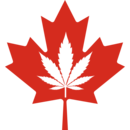| Part of a series on |
| Cannabis in Canada |
|---|
 |
| National legislation |
| Provincial and territorial regulations |
| Other jurisdictions |
|
Cannabis portal Canada portal |
The Cannabis Act (C-45) of June, 2018 paved the way for the legalization of cannabis in Canada on 17 October 2018.[1] Police and prosecution services in all Canadian jurisdictions are currently capable of pursuing criminal charges for cannabis marketing without a licence issued by Health Canada.[2][3][4] The Supreme Court of Canada has held that the federal Parliament has the power to criminalize the possession of cannabis and that doing so does not infringe upon the Canadian Charter of Rights and Freedoms.[5] The Ontario Court of Appeal and the Superior Court of Ontario have, however, held that the absence of a statutory provision for medical marijuana is unconstitutional, and to that extent the federal law is of no force and/or effect[6][7] if a prescription is obtained.[8] The recreational use of cannabis has been legalized by the federal government, and took effect on 17 October 2018.[3]
Since 1997, public opinion polls have found that an increasing majority of Canadians agree with the statement, "Smoking marijuana should not be a criminal offence".[9] A June 2016 national poll conducted by Nanos Research showed that 7 in 10 Canadians were in favour of legalization.[10]
Challenges to marijuana laws at the federal level did not result in the deletion of the appropriate sections from the Controlled Drugs and Substances Act.[3] Legalization for personal (non-medical) consumption would need to be legislated, and that is the plan of the Government of Canada, as confirmed in 2015 and more specifically in 2016.[11] The enactment of that legislation will be the concluding point in a long history of attempts to legalize cannabis through the courts.
In 2016, the Government of Canada was working on legislation to legalize cannabis. The final wording was still under discussion in late March 2017, but a probable date for the official effect of the legislation was widely publicized as 1 July 2018. The provinces will have the power to determine the method of distribution and sale as well as the legal age for cannabis use.[12][13]
- ^ "Marijuana legalizat Bill C-45 officially passes Senate vote, heading for royal assent - National | Globalnews.ca". 19 June 2018.
- ^ Benzie, Robert (3 December 2016). "Trudeau urges police to 'enforce the law' on marijuana". Toronto Star. Toronto. Retrieved 4 December 2016.
A "frustrated" Prime Minister Justin Trudeau wants police to enforce the law and criminally charge illegal marijuana dispensaries.
- ^ a b c "Controlled Drugs and Substances Act – Schedule II". Government of Canada. 6 November 2012. Retrieved 9 July 2015.
- ^ "Marihuana for Medical Purposes Regulations". laws-lois.justice.gc.ca. Retrieved 5 July 2015.
- ^ R v Malmo‑Levine; R v Caine, [2003] 3 SCR 571, 2003 SCC 74.
- ^ "Ontario Court Ruling on Medical Marijuana". About.com. 8 June 2000. Archived from the original on 21 December 2007. Retrieved 27 July 2013.
- ^ "Ontario closer than ever to legalization of marijuana". National Post. 13 April 2011. Retrieved 27 July 2013.
- ^ "Procedures for Accessing Dried Marijuana for Medical Purposes Under the Marihuana for Medical Purposes Regulations". Health Canada. Retrieved 5 July 2015.
- ^ "Public Opinion and Illicit Drugs - Canadian Attitudes towards Decriminalizing the Use of Marijuana" (PDF). The Fraser Institute. April 2001. Archived from the original (PDF) on 29 June 2013. Retrieved 23 October 2015.
- ^ "7 in 10 Canadians support marijuana legalization". CTV News. 30 June 2016. Retrieved 11 October 2016.
- ^ Bronskill, Jim (17 December 2015). "Tax on legalized pot won't be a cash cow: PM". CTV News. Bell Media. Retrieved 23 December 2015.
- ^ Cochrane, David (26 March 2017). "Liberals to announce marijuana will be legal by July 1, 2018". CBC. CBC. Retrieved 28 March 2017.
- ^ "Globe editorial: Why marijuana prohibition failed, and how legalization can succeed". theglobeandmail.com. 22 September 2017. Retrieved 12 January 2018.
